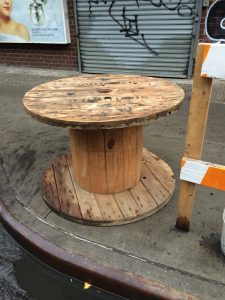I’ll be teaching a course this summer on “Objects of Play,” in the strange hope that if we looked at the things we play with, we might surprise ourselves. We’ll be looking particularly at the large scale toys—ladders, oil barrels, etc.—at play in the early childhood education of Anji, China.
I am reminded of my own childhood, spent largely out of adult view, and largely as high up in a tree as I could get. Play consisted of ascertaining whether a particular branch would hold my weight or not…
There is always risk in play, even if it is the risk of not seeing what is at stake.
Have you heard the one about the farmer who refuses to lend his neighbor a rope because, he claims, “he is using it to tie up his milk?” The neighbor points out how absurd that is, to which the farmer responds, “Maybe, but if I don’t want to lend you the rope, one excuse is as good as another.”
The joke, of course, is that you aren’t supposed to say that to the person’s face. It is de rigueur to at least come up with a reasonable sounding excuse. But it is as if we, to the extent that we are the farmer, hardly want to be bothered. In this sense, pointing out the absurdity of logic changes nothing. Whether we are using our rigor to tie up milk or not hardly matters; what we prefer is not to have to come up with a good use for it. In that case, the real joke is not that we have said the unsayable at the expense of the neighbor, showing competition to trump reason. The joke is instead that the neighbor is our excuse for why we rigorously tie up our milk. The neighbor is expendable, but as a necessary expense to cover up the absurdity that the tying of milk is essential.
Rigor is merely de rigueur—a question of etiquette and protocol. Or is it more difficult than that? Is it the call for rigor that is operative, in opposition to any rigor actually achieved? We must keep ourselves busy. In this case, the most radical proposition would be that we don’t even want to keep ahead of the world; we just want to not have to think about what we are doing in the name of education. Paradoxically, we ask not that the student/neighbor believe us, but that they agree anyway. The rope coils on itself, and must be decoupled from any reasonable object. The more unreasonable the proffered object, the better. Only we should step carefully here: it is not that one should go out of one’s way to find an object that is unreasonable—that is, to offend one’s neighbor. Reason, rather is a function of the coiling itself. The object’s “unreasonableness” is merely its indifference to the procedure. Any number of procedures will suffice, even the establishment of a subject area and its essential content, a textbook, a protocol, a test.
How do we play when we are not playing? To what object? Will any suffice? Or does it matter, the properties of milk? Of ropes? What assemblages do we make for ourselves?
